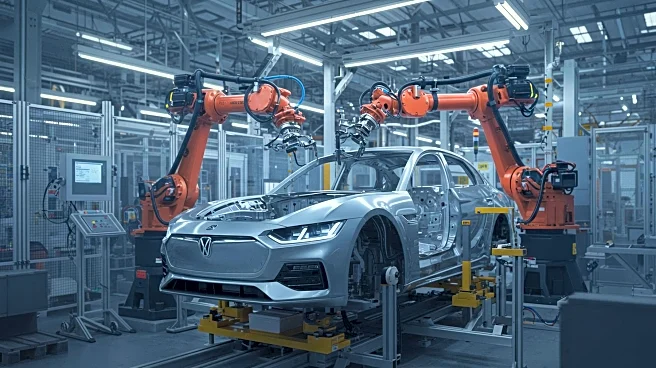What is the story about?
What's Happening?
Ford is transforming its traditional car manufacturing process with the introduction of the Universal EV Production System. This new system divides the assembly line into three distinct sections, each responsible for assembling major parts of the vehicle: the front, rear, and center. The innovation is part of Ford's $5 billion investment in creating a modular electric vehicle ecosystem, aimed at producing affordable EVs, including a $30,000 electric pickup truck set for release in 2027. The system enhances automation and efficiency by utilizing large aluminum unicasting pieces, allowing separate assembly of vehicle sections. This approach improves ergonomics for workers and accelerates production, potentially reducing assembly time by up to 40%. The Louisville Assembly Plant in Kentucky will be the first to implement this system, supported by a $2 billion investment and incentives from the Kentucky Economic Development Finance Authority.
Why It's Important?
Ford's Universal EV Production System represents a significant shift in automotive manufacturing, potentially setting a new standard for efficiency and cost-effectiveness in the industry. By streamlining the assembly process and reducing the complexity of vehicle construction, Ford aims to lower production costs and make electric vehicles more accessible to consumers. This move could enhance Ford's competitiveness in the growing EV market, particularly as demand for affordable electric trucks increases. The system's focus on improving worker ergonomics and reducing assembly time may also lead to higher productivity and job satisfaction, benefiting both the company and its workforce.
What's Next?
Ford plans to continue investing in its manufacturing capabilities, with the Louisville Assembly Plant serving as a model for future implementations of the Universal EV Production System. The company is also focusing on local production of lithium-iron phosphate batteries at its BlueOval Battery Park in Michigan, further supporting its commitment to domestic manufacturing. As Ford rolls out its new electric pickup truck and other EV models, it will likely face reactions from competitors and stakeholders in the automotive industry, potentially influencing broader trends in EV production and market dynamics.















